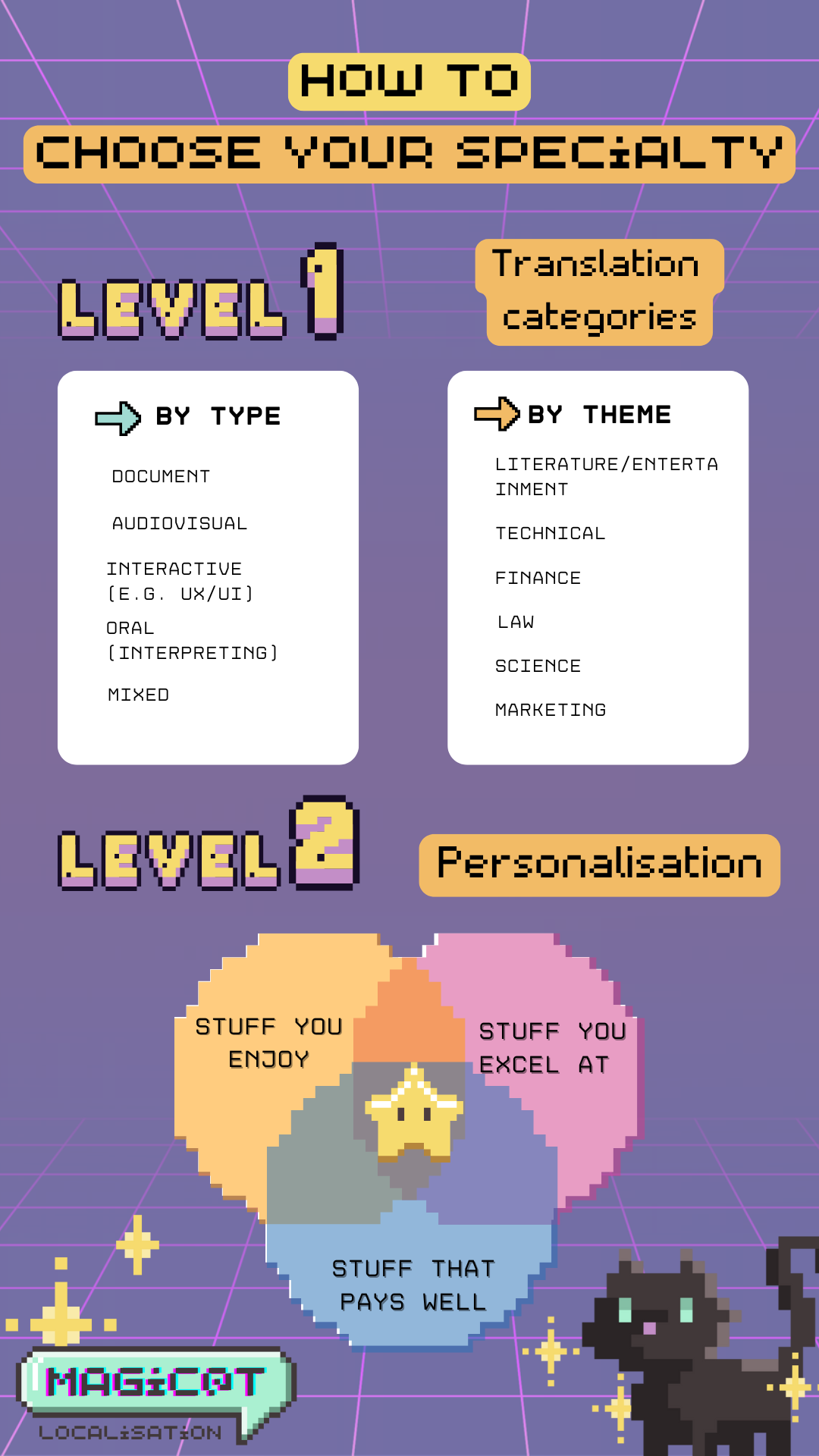Hello, hello, fellow language magicians!
☆*:.。.o(≧▽≦)o.。.:*☆
Today, I'm bringing you a quick little post + infographic about professional specialisation.
Inspired by a LinkedIn post that asked this exact same question, I thought I'd shame my own two cents for all the new (or old, we don't judge here) translators out there looking to find their footing in the field and narrow down their services to a manageable "niche", if you may. This is specifically made for translation professionals, but its logic may apply to anything, if you squint at it hard enough.
Anyhow, here's the gist:
Your'e a translator looking to narrow down your offered services to a specific area/niche in order to better position yourself in the industry, or for easier marketing purposes, or simply just to find your own hill to die, I mean, rest upon, instead of trying to do everything, all at once. Whatever your goal, my advice is the same.
1. Choose HOW you want to limit yourself
The translation industry is vast, and the possibilities it offers its people even vast-er. You'll need a guide to help you narrow down your choices, or to at least give you a pointer toward the right direction. I suggest one of two methods: picking your translation field(s) by type, or by theme.
By "type" I mean the practical aspect of the job. Consider this:
And so on, and so forth.
On the other hand, theme is more about what type of content you'd like to work on:
Once you're done asking those things, take a note at your answers and look for points of intersection. No matter what your tastes and preferences are, there's bound to be a specialisation that suits you, but you might need to be a bit... creative to get the perfect one for you. Which brings me to step 2:
2. Choose WHERE you want to limit yourself
This is where you get to see your choices more clearly, but also, where you may be called to leave something out for your own good. It all comes down to balancing your choice between three major categories:
It's all great and dandy to say you only even want to do Horror game translation, but how will you support that career choice if your language combination never EVER has a gig for grabs? (Yes, I know, minor language issues, but it serves to make a point). You'll need to take a look at what the market has to offer; see what the clients are looking for, see what opportunities exist in which types of translation, see what the average rates are and if they suit your needs (even artists have to eat), and see where you have the potential to make room for yourself to bloom in. Don't forget to add in the equation your strengths: great technical skills, attention to detail, impeccable oratory skills, endless imagination... whatever it is you do best and under which conditions. This will be how you know you can prove your worth. Aiming for what you enjoy is great, but in order to truly succeed you'll need to captalise on what you do best--it's your biggest selling point.
If you're an experienced professional with years and years of knowledge on your back, you also need to account for that. Think of the areas/fields that your CV/portfolio gives you more leverage in and work your way from there... OR think if the skills showcased by said CV to aim for something completely new, without having to start from scratch.
Once you have all of that accounted for, look for the place where all of these overlap, where you'd be most comfortable in. TADA! That's your shiny, new specialisation! Here's your achievement ca--
What? You don't want to limit yourself to that one thing, you say? Okay then, how about instead of taking that small area and making it your WHOLE career, you can simply use it like a pin on a map, of sorts, and place yourself in the area around it. This way you still have a guiding stone, a point of reference and a fallback in case you ever get tired of wandering around. This specialty is the heart of your professional identity, but it's not necessarily your entire self. You see, people are multifaceted creatures, in all aspects of their lives. Maybe the things you like to work on seem disconnected and unrelated at first, but when you look at them in light of your newly realised specialisation you may find more common ground than first meets the eye.
"Ok, now you're just sprouting b@#@$...", is what you're thinking, right? Well, yes and no. Maybe an example will help illustrate things better.
Here's MY specialisation wormhole, to help illustrate the method:
1. Choosing the HOW:
2. Choosing the WHERE:
Now, let's combine everything together:
At heart, I'm a video-game localisation specialist. It gives me the possibility to work with all kinds of content, combining every story telling medium with the extra benefit of having an interactive aspect which informs the translation's scope. The perfect niche for a jack-of-all-trades translator with a love for fantasy and adventure.
Now, branching out from that, I can take on separately any part of the game-loc buffet: UI/UX loc, subtitling, dubbing script adaptation, text element localisation, translation of complimentary documentation (from user manuals, to flavour texts, etc), I do it all, but never straying to far from my core: story-telling and multimedia.
And there you have it!
I hope you found this little blog post interesting and maybe even somewhat helpful.
(´。• ω •。)
If you have any comments, questions or suggestions, feel free to hit me up. I'm always open to a good nerdy talk about languages, translation and everything in between.
Until next time, Magicat, signing out! ฅ^•ﻌ•^ฅ

Did you like this post? Tell us
Leave a comment
Log in with your itch.io account to leave a comment.